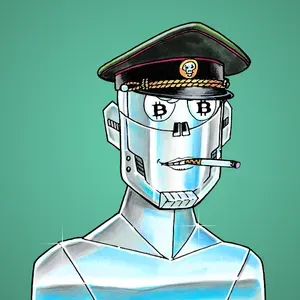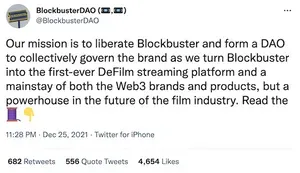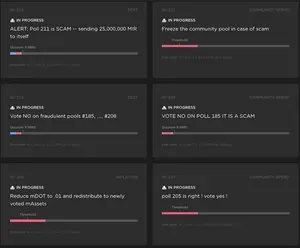The "Cipher Punks" NFT project tried to sell NFTs with illustrations of various cypherpunks, or at least the ones that were listed on Wikipedia. The project said that it intended to "[honor] everyone involved in the CypherPunk movement. They are our heroes, and we need to recognize them". Apparently honoring them did not also involve asking for their consent to be used in the project, as Jillian York tweeted on December 26, "I don't approve of this whatsoever and would like it removed."
ItsBlockchain, the group behind the project, subsequently announced that they would scrap the project and apologized. This apology rang a little hollow, to me, after they retweeted a tweet saying "never meet your heroes" in reference to the individuals asking that the project stop using their likeness without their consent, for their own profit.JungleFreaks and Sandbox NFTs are stolen from a collector
bergpay.eth checked his MetaMask wallet on the day after Christmas only to discover that all his NFTs had been stolen, including five from the popular "Jungle Freaks" collection and 2 from "Sandbox". Jungle Freaks average about 0.9 ETH ($3,700) each; Sandbox NFTs average around 2.75 ETH ($11,300) each.
A DAO forms with the goal of "liberating" Blockbuster, hoping to raise $5 million from NFTs
A group called "BlockbusterDAO" emerged, with the stated goal of "liberat[ing] Blockbuster and form[ing] a DAO to collectively govern the brand as we turn Blockbuster into the first-ever DeFilm streaming platform". Ideas for the DAO's plans after buying the corporation included creating original films and also getting into crypto gaming, for some reason. Some outlets noted that it's unlikely Dish, the current owner of Blockbuster, would sell the corporation for any amount (and particularly for an amount $315 million less than what it bought them for ten years ago), but I suspect that minor detail is unlikely to slow the group down much.
Elon Musk tweeting a photograph of his dog in a Santa suit somehow pumps a memecoin
On Christmas, Elon Musk tweeted a very cute photograph of his pet dog, Floki, wearing a Santa suit with the caption "Floki Santa". Creators of a memecoin called "Santa Floki" ($HOHOHO, of course) capitalized on this with a claim that he'd been tweeting about their coin, and the token surged by 18,840% in about 48 hours (from $0.000000012935 to a whopping $0.00000245). The value quickly fell back below this new high, and settled back to around the pre-tweet price not long after.
An attempted governance attack aims to defraud 25 million MIR (about $64.2 million) from Terra's Mirror protocol
A scammer created a public poll on Mirror's official website, proposing to "Freeze the community pool in case of scam". However, if the poll passed, it would send 25 MIR to the poll creator. Because of the design of the poll system, Mirror can't remove the poll, and so has attempted to inform its community of the potential scam by creating a different poll, as well as tweeting about it. The governance platform shows a slew of polls, including, "Alert: Poll 211 is SCAM -- sending 25,000,000 MIR to itself", "Vote NO on fraudulent pools #185, ..., #208", "VOTE NO ON POLL 185 IT IS A SCAM", and "poll 205 is right ! vote yes !"
Steve Bannon touts a "Fuck Joe Biden" coin that looks designed to scam investors
Around the holidays, Steve Bannon started touting a "Fuck Joe Biden" ($FJB) coin (formerly known as the "Let's Go Brandon" coin, and not to be confused with the other Let's Go Brandon coin) on his podcast. He and his partners have touted investing in the currency as a way to somehow "let your feelings, your primal disapproval, your primal disgust with Biden be heard" (and certainly not just a way to pad Bannon's own pockets). Reviewers inspecting the coin's contracts observed some unusual features, including provisions that allow the currency's operators to manually lock an individual's token balance so they can't sell (how decentralized!), though this of course does not apply to the operators themselves. One reviewer observed how this could easily be exploited for rug pull purposes, if the operators locked token holders from selling as they sold off their own coins, allowing them to get out before others started selling off too.
NFT collector scammed out of Bored Ape NFT: "This was my kids college. My mortgage."
An NFT collector lost his Bored Ape NFT to a scammer impersonating the well-known NFT collector Jeffrey Huang, aka "Machi Big Brother". The real Huang did eventually buy the NFT off the scammer for 77 ETH (about $290,000) and agreed to sell it back to its original owner for that price. Although the original owner tweeted on December 30 that they were "trying to launch a project that will help me raise funds to buy back my ape that was stolen", the following day they seemed disillusioned with the whole space. They wrote, "Been trying to put on a good face since I lost my ape but I gotta be honest. This was my kids college. My mortgage. Just absolute shit that some of you out there think it's okay that I got ripped off. Fuck you if you think theft is okay because I wasn't 'smart' enough. I got news for you tool boxes. This space is going to zero and regulators are coming hard because the lay person isn't coming with the attitude of a lot of you. No one is coming to a space where they aren't sure there investments are safe. Good luck in the meta".
Open source contributors and advocates are surprised to find photographs of themselves being sold as NFTs
Some prominent open source advocates and contributors were surprised to find that their likenesses were turned into NFTs by an artist who photographed them in 2018. Kris Nóva tweeted, "What would you do if you woke up and found out somebody made an NFT of you? Because that just happened to me and a lot of other open source contributors and thought leaders." She later wrote that the photographer "ended up reaching out, his heart is totally in the right place." However, it still seems pretty gross to me that the NFT creator didn't check with the subjects before using their likenesses in the NFT project, and that he prominently featured Kelsey Hightower, an outspoken critic of web3 who I suspect would not approve of his image being used in such a way, in the branding for the project.
Funko Pop launches Bob Ross NFTs in apparent disregard of Ross's wishes
Because apparently the vinyl figurines known as Funko Pops aren't a sufficiently useless collectible, Funko decided to get in on the NFT craze by releasing a Bob Ross "Digital Pop". Ross made major changes to his will just before his death to try to prevent people from merchandising his legacy, and many fans were outraged by the NFT project, which they believe is exactly the sort of thing he was trying to prevent from happening.
Visor Finance is hacked for about $8.2 million
A reentrancy exploit in the Ethereum-based Visor Finance DeFi protocol allowed hackers to pull 8.8 million VISR tokens out of the network, equivalent to about $8.2 million. The VISR token went from trading at around $0.93 to around $0.04, losing more than 95% of its value. The Visor team subsequently announced that they would perform a token migration to compensate affected users. Visor has suffered other hacks since its launch earlier in 2021, despite having undergone several audits.
- "$8.2M Lost as Visor Finance Suffers Latest DeFi Hack", CryptoBriefing










